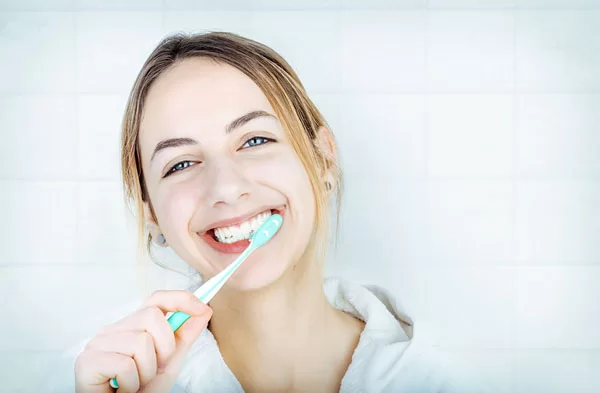Key Takeaways
- Wait 2-3 hours after your filling procedure before eating to allow the local anesthetic to wear off and prevent accidentally biting your numb tongue or cheek.
- Tooth sensitivity to hot or cold foods for 24-48 hours after a filling is common and normal, but contact your dentist if it persists beyond a week or becomes severe.
- Brush twice daily with fluoride toothpaste, floss daily, and use a soft-bristle toothbrush to protect your filling and prevent decay around the margins.
- Stay away from sticky foods like taffy and chewing gum that can dislodge fillings, and hard foods like ice and nuts that may crack your filling.
- Visit your dentist regularly for check-ups to monitor filling condition and detect issues like sensitivity, cracks, or rough edges before they become serious problems.
Dental Filling Care Tips from Your Local Hilliard Dentist
At Fishinger Dental, your trusted dentist in Hilliard, OH, we understand that proper dental filling care is essential for maintaining optimal oral health. Whether you’ve recently had a cavity filling procedure or need guidance on caring for existing dental fillings, our experienced team is here to help patients in Columbus, Dublin, Upper Arlington, Grove City, Westerville, and surrounding areas achieve lasting results.
If you’re searching for a dentist near you who specializes in comprehensive dental filling care, contact our dental office in Hilliard at (614) 771-6060 to schedule your appointment today.

What to Expect After the Dental Filling Procedure
After your filling procedure, it’s normal to experience some tooth sensitivity as the local anesthetic wears off. Here’s what you should know:
- Wait two to three hours before eating to allow the numbing medication to fully wear off
- Chew slowly and avoid biting your cheek, tongue, or lips while still numb
- Avoid chewing on hard foods immediately after the procedure
- Some sensitivity to hot or cold foods is normal for the first 24-48 hours
Experiencing tooth sensitivity after a dental filling procedure is common and typically subsides within a few days. Some tooth sensitivity after a filling is normal, usually feeling like a sudden shock of pain triggered by extremely hot or cold food or drinks. Contact our dentist’s office if sensitivity persists beyond a week or becomes severe.
Essential Dental Filling Aftercare: Taking Good Care of Your Investment
1. Maintain Excellent Oral Hygiene
Proper oral hygiene is the foundation of dental filling longevity. Our American Dental Association-recommended approach includes:
- Brush your teeth at least twice daily with fluoride toothpaste
- Use a soft-bristle toothbrush to protect your filling from damage
- Floss daily to prevent further decay around the filling margins
- Consider an antimicrobial mouthwash to reduce bacteria
2. Dietary Guidelines for Dental Filling Care
What to Avoid:
- Sticky foods like taffy, caramel, and chewing gum can dislodge fillings
- Hard foods such as ice, nuts, and hard candies may crack your filling
- Acidic beverages can weaken tooth enamel and compromise filling integrity
- Excessive sugar contributes to tooth decay around fillings
What to Embrace:
- Soft, nutritious foods during the initial healing period
- Plenty of water to rinse away food particles
- Calcium-rich foods to strengthen teeth
- Fresh fruits and vegetables (cut into manageable pieces)
3. Recognize When to Contact Your Hilliard Dentist
Contact our dental office in Hilliard immediately if you experience:
- Pain that worsens or persists beyond 48 hours
- Discomfort when biting down that doesn’t improve
- Sharp edges on your filling
- Signs of infection, such as swelling or discharge
- Changes in your bite alignment

Additional Dental Filling Care Tips
Protecting Against Future Decay
Higher-risk patients may need additional preventive measures:
- Regular fluoride treatments
- Dental sealants on remaining healthy teeth
- More frequent dental cleanings
- Custom mouthguards for teeth grinding
Understanding Different Filling Types
The care requirements may vary depending on your filling material:
- Composite (tooth-colored) fillings: Avoid staining substances initially
- Amalgam (silver) fillings: Allow 24 hours before chewing on the filled tooth
- Ceramic fillings: Follow specific care instructions provided by your dentist
Frequently Asked Questions
Is tooth sensitivity normal after getting a filling?
Yes, mild sensitivity is normal for 24-48 hours after your dental filling procedure. However, severe or prolonged sensitivity requires evaluation by your dentist.
What should I do if my dental filling feels weird when I bite?
If you have just gotten dental fillings and feel like your bite feels uneven or you experience pain when closing your teeth, schedule an appointment with our Hilliard dental office for a bite adjustment.
How often should I visit my dentist in Hilliard for filling check-ups?
Regular dental check-ups every six months allow our dentist to monitor your fillings and detect any issues early, preventing more extensive procedures.
What are the signs that my dental filling needs replacement?
Watch for sensitivity, pain, visible cracks, rough edges, or food getting trapped around the filling. Our dental team can assess the filling condition during routine visits.
Schedule Your Dental Filling Consultation in Hilliard
Don’t let dental concerns affect your smile and overall health. Our experienced team at Fishinger Dental is committed to providing exceptional dental filling care to patients throughout Hilliard and the surrounding communities, such as Columbus, Dublin, Upper Arlington, Grove City, and Westerville.
Take the first step toward optimal dental health—contact our dental office in Hilliard today at (614) 771-6060 to discuss your dental filling needs and learn more about our comprehensive dental services.
At Fishinger Dental, we combine advanced dentistry techniques with personalized care to ensure your dental fillings provide lasting protection and comfort. Our commitment to excellence has made us a trusted choice for dental filling care in the Hilliard community.





